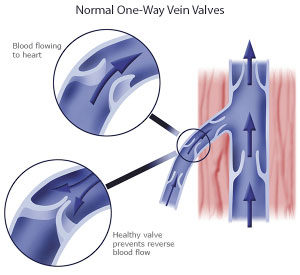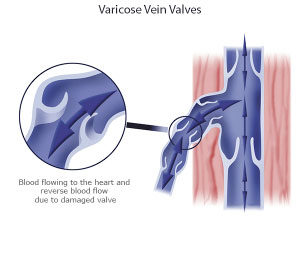
Men who have received a varicocele diagnosis often have many questions. Is this condition dangerous? Can it affect my fertility? What is the potential impact on my long-term health?
A varicocele is a type of varicose vein. Varicose veins develop when the valves in your veins don’t work properly. Healthy valves help keep blood flowing in the right direction as your heart pumps blood throughout your body. When these vein valves malfunction, blood may pool in some regions of the vein, causing it to enlarge, resulting in pain or swelling. (i)


It’s important to understand that varicoceles usually do not lead to any serious health problems. Up to 15 percent of men have them, and they often don’t cause any symptoms. (ii) But, in some men, varicoceles symptoms can still develop.
Common symptoms of a varicocele include: (i)
- Groin pain
- Swollen veins in the testicles
- One testicle is larger than the other
- Pain that gets worse when you’re standing
- Pain that lessens when you’re lying down
- Pain that gets worse in hot weather
- Pain that gets worse after exercising
Understanding Your Varicocele Diagnosis
When you receive a varicocele diagnosis, your doctor may use a variety of unfamiliar terms.
For diagnostic purposes, your doctor may refer to your condition as “scrotal varices.” Your doctor may also refer to a grading system to describe your varicocele. Clinical grade is one of the most important factors in determining varicocele management. Your doctor may tell you that you have a “primary” or “secondary” varicocele. It’s important to understand what all these terms mean.
Primary and Secondary Varicoceles
A primary varicocele develops due to malfunctioning valves in your veins, which cause blood to pool in one area of the vein. Secondary varicoceles develop when a mass in your scrotum blocks blood flow. Both primary and secondary varicoceles can be graded using the classification system below. (iii)
Grades of Varicoceles

- Grade I varicoceles may be detected during a physical exam. During this exam, your doctor has you perform breathing exercises, such as the Valsalva maneuver, to assist in detecting any abnormal enlargement of the veins, while your doctor feels your scrotum. Grade I varicoceles are associated with pressure type varicoceles, which develop when the spermatic vein fills with blood. (iv)
- Grade II varicoceles may be detected during a physical exam, even without the Valsalva maneuver. These varicoceles are more noticeable, and you may become aware of them during a self-exam.
- Grade III varicoceles are detected through a visual examination alone. These varicoceles are often the most noticeable, as your scrotum may look or feel like a bag of worms. (iv)
Grades II and III varicoceles are associated with shunt type varicoceles. These are similar to pressure type varicoceles, but the backup of blood is more severe and may result in damage to the veins. (iv)
Although varicoceles can often be diagnosed through a physical or visual exam, your doctor may also recommend a scrotal ultrasound. The varicocele ultrasound examines the tissue in your scrotum using ultrasound technology.
An ultrasound can help your doctor determine whether your varicocele is causing significant damage to your testicles. It can also rule out other potential health problems with similar symptoms. (iv)
Untreated Varicoceles May Lead to Complications
When varicoceles are left untreated, the following three complications may develop:
- Testicular atrophy – A varicocele may cause the affected testicle shrink or atrophy.
- Low testosterone – Varicoceles can affect testosterone production. (v) Low testosterone may be linked to potentially significant health problems like diabetes and obesity. (vi) Symptoms of low testosterone can include fatigue, weight gain, erectile dysfunction, low sex drive, irritability, depression and (vi)
- Infertility – Varicoceles can also cause male infertility. (vii) Varicoceles can increase the pressure and temperature in your testicles. (vii) A higher temperature or increased pressure can block sperm production, and if you have a varicocele, your sperm count may be lower than usual or your sperm may be damaged. Damaged sperm can be less mobile, which can harm your chances of conceiving. Fortunately, seeking treatment can often reverse these issues. Many men with varicoceles can successfully have children after seeking treatment. (viii)When Should I Seek Treatment?
Deciding to seek treatment for a varicocele is a highly personal decision. A vascular specialist can help you determine whether treatment is necessary. The good news is that most varicoceles can be successfully treated. Minimally invasive procedures like varicocele embolization provide an effective, low-risk option for treating your varicocele. (ix)
Struggling to understand your varicocele diagnosis? Ready to learn more about your treatment options? The vascular specialists at Azura Vascular Care can provide in-depth information about your varicocele condition and treatment options. Call 844-705-VEIN (8346) to schedule an appointment with a vascular specialist.
Sources:
(ii) Stanford Health Care. Symptoms of varicocele. Retrieved August 1, 2018, from https://stanfordhealthcare.org/medical-conditions/mens-health/varicocele/symptoms.html
(iii) Manski, D. (2018, May 15). Varicocele of the Testis (1/2). Retrieved August 6, 2018, from http://www.urology-textbook.com/varicocele.html
(iv) Newman, T. (2018, January 9). Varicoceles: Treatment, surgery, and symptoms. Retrieved August 6, 2018, from https://www.medicalnewstoday.com/articles/221051.php
(v) Tanrikut, C., Goldstein, M., Rosoff, J. S., Lee, R. K., Nelson, C. J., & Mulhall, J. P. (2011). Varicocele as a risk factor for androgen deficiency and effect of repair. BJU International__108(9):1480-1484. Retrieved July 31, 2018, from https://www.ncbi.nlm.nih.gov/pubmed/21435152
(vi) WebMD. (2017, January 14). Low testosterone and your health. Retrieved August 1, 2018, from https://www.webmd.com/men/what-low-testosterone-can-mean-your-health
(vii) Kantartzi, P. D., Goulis, C. D., Goulis, G. D., & Papadimas, I. (2007). Male infertility and varicocele: Myths and reality. Retrieved August 1, 2018, from https://www.ncbi.nlm.nih.gov/pmc/articles/PMC2658802
(viii) Kumar, N., & Singh, A. K. (2015). Trends of male factor infertility, an important cause of infertility: A review of literature. Journal of Human Reproductive Sciences 8(4):191-196. Retrieved July 31, 2018, from https://www.ncbi.nlm.nih.gov/pmc/articles/PMC4691969/
(ix) John Hopkins Medicine. Varicocele embolization. Retrieved August 1, 2018, from https://www.hopkinsmedicine.org/healthlibrary/test_procedures/urology/varicocele_embolization_135,383


